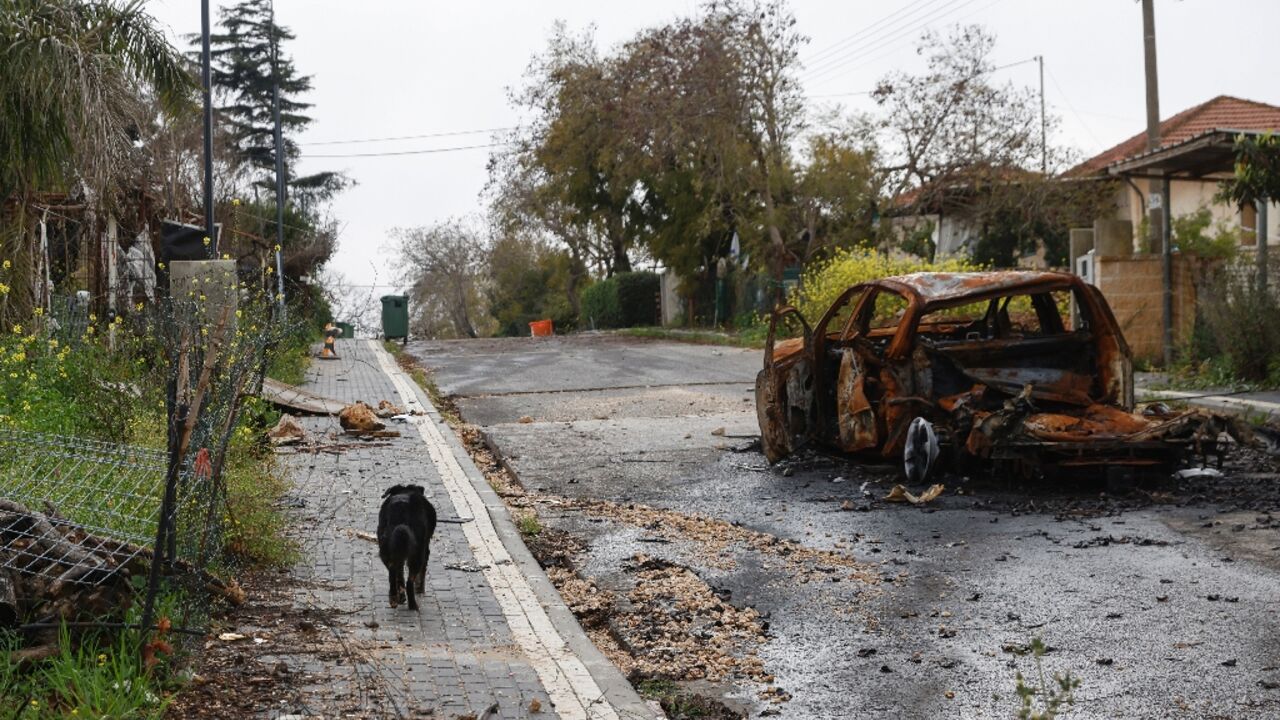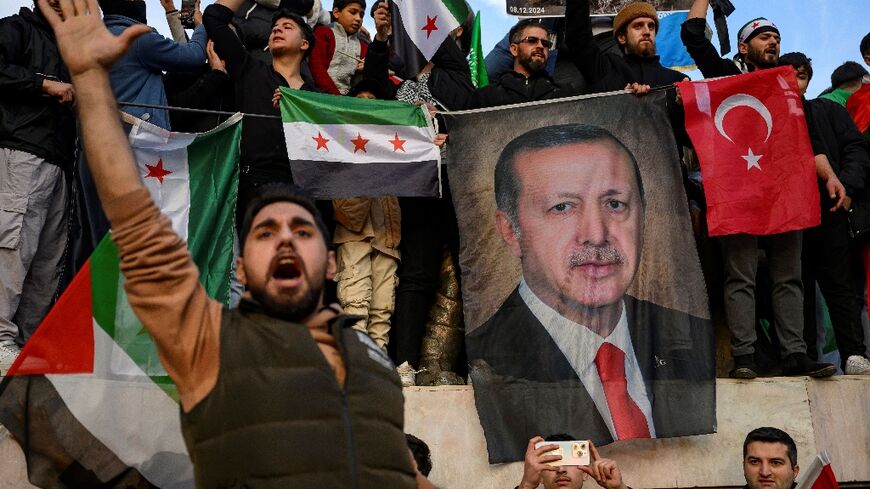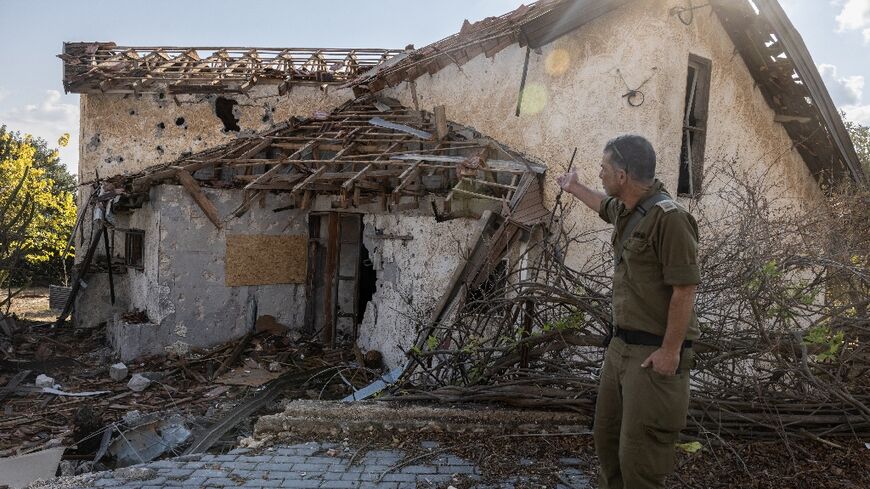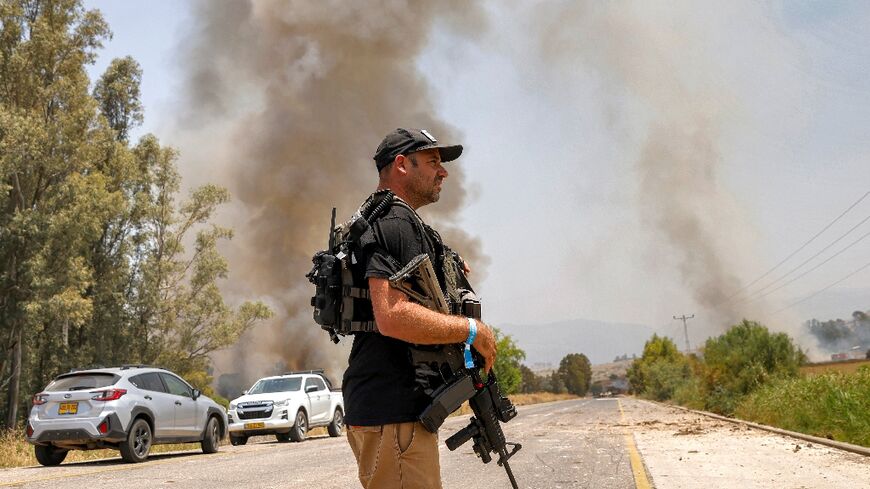'No other choice': Israeli border towns eye war with Hezbollah

Displaced residents of Israel's northernmost town have learned to dread hearing from David Azulay -- the man who calls when Hezbollah rockets have crashed into their abandoned homes.
The 57-year-old has been mostly on his own since nearly all of Metula's inhabitants fled following the outbreak of war between Israel and Hamas in October.
As head of the town council, Azulay felt an obligation to stay behind and monitor damage wrought by Lebanon-based Hezbollah as it fires missiles and mortars on northern Israel in solidarity with Hamas, its Gaza-based ally.
That has meant sleeping in a bomb shelter in Metula -- bordered by Lebanon to the west, north and east -- while keeping a grim tally of the destruction.
So far, 130 out of 650 homes have been hit in the town, some with entire floors destroyed and entrances covered in glass and rubble.
Now, with the Gaza war in its sixth month and no end in sight to near-daily fire between Israel and Hezbollah, Azulay said the only solution could be no-holds-barred fighting to clear Hezbollah from the border and make the area safe for evacuated Israelis to return.
"I don't see another way for citizens to come back safely to their homes here," he said this week, standing not far from a bombed-out car in the middle of a street lined with citrus trees.
"We've had enough of war, but we have no other choice right now. They are shooting at the houses of civilians, not army bases," he told journalists in Metula on a press visit organised by Israeli authorities.
- 'I don't sleep at night' -
Though many analysts disagree, the idea that Hezbollah is trying to provoke a war is commonly held among Israelis in the north, where tens of thousands have been displaced, reducing 43 communities to "ghost towns", said former military intelligence officer Sarit Zehavi.
Both Paris and Washington are pursuing plans to defuse hostilities, but Zehavi said she feared any deal might not address the threat posed by the group.
She told reporters during a presentation that was part of the press visit that Hezbollah would "prefer to drag Israel into war rather than initiate it. But they are still capable of infiltration."
"I don't sleep at night worrying that we will end up with a ceasefire that will not eliminate completely this capability," she added.
The damage on both sides of the border is real, but that does not mean all-out war is inevitable, analysts noted.
"It's unlikely that Hezbollah wants a full-scale war as there would be no element of surprise, which is essential for the group when the balance of military power is asymmetrical," said Hamish Kinnear, senior Middle East analyst with Verisk Maplecroft.
"A full-scale war being initiated by Israel remains unlikely as it maintains its focus and resources on fighting Hamas."
Israel's top ally the United States is also set on avoiding a wider regional conflagration if possible.
Hussein Ibish of the Arab Gulf States Institute in Washington said it was Israel's -- not Hezbollah's -- actions that had been increasingly escalatory, including strikes on Baalbek some 100 kilometres (60 miles) from the border.
He said there were signs Israel was preparing for a "spring offensive" in Lebanon, or at least working hard to send that signal.
"They want to create the impression that this is an unavoidable war to make northern Israel safe for human habitation again," he said.
- 'We deserve peace' -
Since hostilities began in October, more than 300 people have been killed in Lebanon by Israeli strikes, mainly Hezbollah fighters, according to an AFP tally.
In Israel, at least 10 soldiers and seven civilians have been killed in the cross-border exchanges, the military says.
These tolls are dwarfed by the Israel-Hamas war.
The October 7 Hamas attack resulted in the deaths of about 1,160 people, mostly civilians, according to an AFP tally of official Israeli figures.
Israel's retaliatory military campaign to destroy Hamas has killed at least 31,923 people, mostly women and children, according to the health ministry in the Hamas-run territory.
Yet in Kiryat Shmona, another northern Israeli town emptied of most civilians, deputy security chief Ariel Frisch said the October 7 attack changed how he and his neighbours saw Hezbollah.
"On October 6, we could to go Metula, see beyond the border the Hezbollah and laugh. Here is the Hezbollah, they have weapons, so what? We have the IDF, we are safe," he said, referring to the Israeli military.
After the attack, "everything changed because we understood invasion is really a threat."
Now he wants that threat to be "eliminated" so life can go back to normal.
"We want peace and we deserve peace," he said. "This isn't peace and this isn't life."









